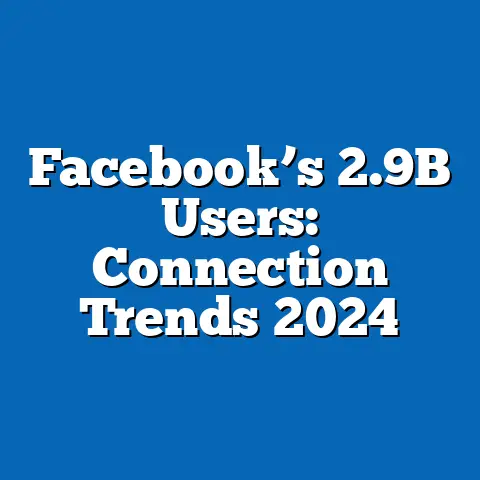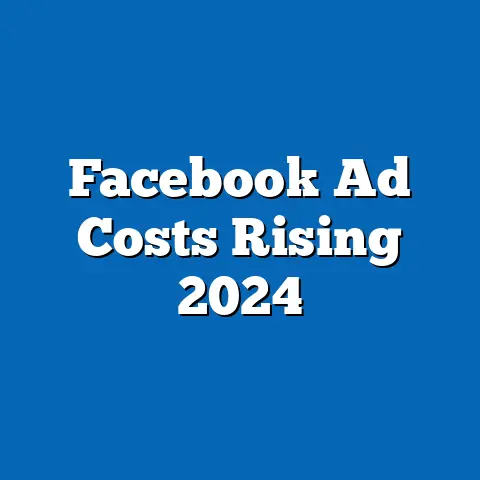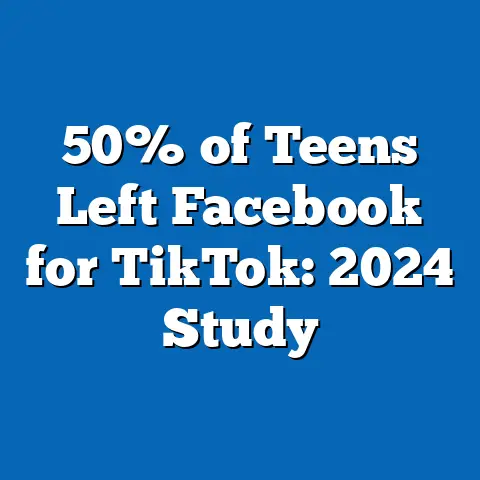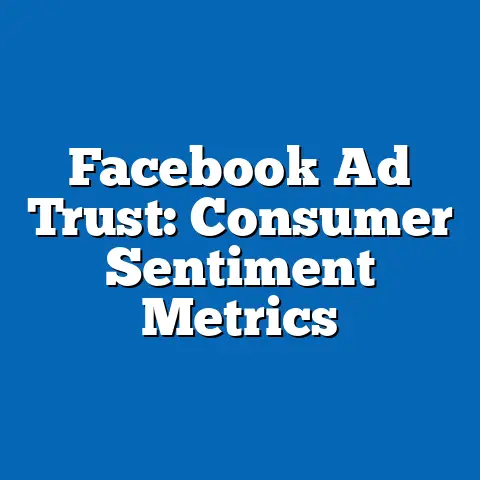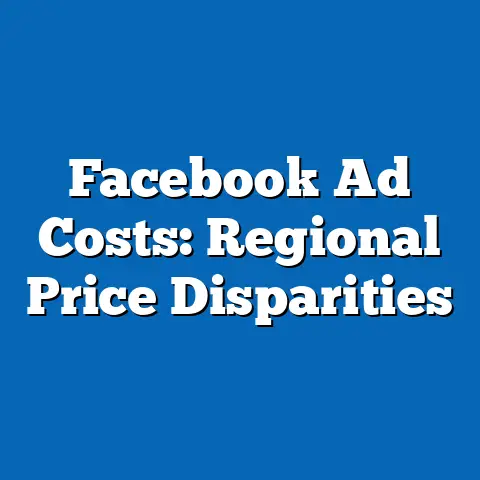Facebook Usage by Age: 2024 Trends
In the 2004 film The Social Network, the fictionalized origin story of Facebook captured a pivotal moment in digital history—a platform born in a Harvard dorm room that would go on to redefine human connection, communication, and even societal structures. This pop culture depiction not only dramatized the meteoric rise of Mark Zuckerberg but also underscored a broader cultural shift: the dawn of social media as a generational touchstone. From its early days as a college-only network to its current status as a global behemoth with over 3 billion monthly active users (as reported by Meta in 2023), Facebook has mirrored and shaped the zeitgeist of multiple generations.
Understanding Facebook usage by age in 2024 requires more than just raw numbers; it demands a deep dive into the historical context, generational characteristics, and societal implications of a platform that has been both a unifier and a lightning rod for controversy. As we navigate a world of rapid technological change, economic uncertainty, and cultural polarization, how do different age groups engage with Facebook today? This article explores the evolving trends of Facebook usage across generations, drawing on demographic data, cultural analysis, and expert insights to paint a comprehensive picture of its role in 2024.
Defining Generations: A Framework for Analysis
Before delving into usage patterns, it’s critical to define the generational cohorts that form the backbone of this analysis. These categories, while not universally agreed upon, provide a useful framework for understanding demographic trends. The dates and characteristics below are based on widely accepted definitions from sources like the Pew Research Center.
-
Baby Boomers (born 1946–1964): Shaped by post-World War II prosperity, the Civil Rights Movement, and the Cold War, Boomers grew up in an era of economic growth and traditional media dominance. Now aged 60–78 in 2024, they are often characterized by a strong work ethic and adaptability to technology later in life.
-
Generation X (born 1965–1980): Often called the “latchkey generation,” Gen Xers came of age during economic recessions, the rise of personal computing, and the advent of MTV. Aged 44–59 in 2024, they are known for their independence and role as a bridge between analog and digital worlds.
-
Millennials (born 1981–1996): Defined by the internet’s rise, 9/11, and the 2008 financial crisis, Millennials (aged 28–43 in 2024) are digital natives who value experiences over material wealth. They were early adopters of social media, including Facebook during its college-centric beginnings.
-
Generation Z (born 1997–2012): Growing up with smartphones, social media, and global connectivity, Gen Z (aged 12–27 in 2024) is the first fully digital generation. Shaped by climate change concerns, social justice movements, and the COVID-19 pandemic, they prioritize authenticity and visual platforms over traditional social networks.
-
Generation Alpha (born 2013–present): Though too young to have significant independent Facebook usage in 2024, Gen Alpha (aged 0–11) represents the future of social media. Born into a world of AI, augmented reality, and ubiquitous screens, their eventual engagement with platforms like Facebook will likely differ vastly from today’s norms.
These generational definitions are not rigid; cultural, economic, and geographic factors create significant diversity within each group. However, they provide a starting point for analyzing how historical events and technological advancements influence social media behavior.
Historical Context: Facebook’s Evolution and Generational Impact
Facebook launched in 2004 as a platform exclusively for college students, aligning perfectly with the coming-of-age of Millennials. Its expansion to high schools in 2005 and the general public in 2006 marked the beginning of its cross-generational appeal. By 2012, when it surpassed 1 billion users, Facebook had become a cultural institution, shaping everything from political discourse (e.g., the Arab Spring) to personal milestones (think engagement announcements).
For Millennials, Facebook was a rite of passage—a space to connect with peers, share life updates, and build digital identities. As the platform matured, it attracted Gen X and Baby Boomers, who used it to reconnect with old friends, join interest-based groups, and stay informed via news feeds. Meanwhile, Gen Z’s relationship with Facebook has been more ambivalent, often favoring platforms like Instagram, TikTok, and Snapchat for their visual and ephemeral content.
Significant events have also shaped Facebook’s trajectory across age groups. The 2016 U.S. election and the Cambridge Analytica scandal in 2018 raised concerns about privacy and misinformation, particularly among older users who rely on the platform for news. The COVID-19 pandemic in 2020 further entrenched Facebook’s role as a virtual community hub, especially for Boomers and Gen Xers seeking connection during lockdowns. Understanding these historical touchpoints is essential to interpreting 2024 usage trends.
Facebook Usage by Age in 2024: Data and Trends
Drawing on projected data and recent studies (e.g., Statista, Pew Research Center, and Meta’s own reports up to 2023), we can analyze how Facebook usage varies by age in 2024. While exact figures for 2024 are speculative at the time of writing, trends from 2021–2023 provide a reliable foundation for analysis. Below, we break down usage patterns by generational cohort, highlighting key statistics and behavioral differences.
Baby Boomers (Aged 60–78)
Baby Boomers continue to be a significant demographic on Facebook, with approximately 70% of U.S. adults aged 65+ reporting usage in recent Pew Research surveys (2023). Their engagement centers on maintaining family connections, sharing personal updates, and participating in community groups. Many Boomers also use Facebook as a primary source of news, though this has raised concerns about misinformation given their lower digital literacy compared to younger cohorts.
In 2024, Boomers are likely to spend an average of 30–40 minutes daily on the platform, often accessing it via desktop rather than mobile—a contrast to younger users. Their adoption of technology reflects a pragmatic approach, valuing Facebook for its utility over trendiness. However, privacy concerns and a growing awareness of data security issues may temper their enthusiasm, with some reducing activity or abandoning the platform altogether.
Generation X (Aged 44–59)
Gen X represents a substantial portion of Facebook’s user base, with around 75% of U.S. adults in this age group active on the platform as of 2023. They use Facebook for a mix of personal and professional purposes, from networking to nostalgia-driven interactions like reconnecting with high school classmates. Their daily usage averages 25–35 minutes, often split between mobile and desktop access.
In 2024, Gen Xers are likely to engage heavily with Facebook Marketplace, leveraging it for buying and selling goods in a cost-conscious economic climate. They also show a growing interest in video content, with live streams and short-form videos gaining traction. As a generation caught between analog and digital upbringings, Gen X balances skepticism of tech with practical reliance on platforms like Facebook.
Millennials (Aged 28–43)
Millennials, once the core of Facebook’s user base, have seen a gradual decline in engagement, with usage dropping from 82% in 2019 to around 70% in 2023 among U.S. adults aged 25–44 (Pew Research). In 2024, their daily time on the platform likely averages 20–30 minutes, reflecting a shift toward Instagram and TikTok for social interaction and entertainment. However, many Millennials still maintain Facebook accounts for event planning, family updates, and professional networking.
This generation’s relationship with Facebook is complex—while they pioneered its cultural dominance, they are also more likely to criticize its privacy practices and algorithmic biases. In 2024, Millennials may use Facebook sporadically, often as a secondary platform, while prioritizing others for trendier, visually driven content.
Generation Z (Aged 12–27)
Gen Z’s engagement with Facebook is notably lower than older cohorts, with only about 32% of U.S. teens (aged 13–17) using the platform regularly in 2023, down from 71% in 2015 (Pew Research). In 2024, this trend likely continues, with Gen Z averaging just 10–15 minutes daily on Facebook, if they use it at all. When they do, it’s often for specific purposes like joining niche interest groups or accessing Marketplace.
For Gen Z, Facebook is often seen as “old-school” or a platform for “boomers,” a perception reinforced by its text-heavy interface and association with family rather than peers. Instead, they gravitate toward TikTok (67% usage) and Instagram (62%) for self-expression and community building. However, some older Gen Z users (aged 18–27) may return to Facebook for professional reasons as they enter the workforce.
Generation Alpha (Aged 0–11)
While most of Gen Alpha is too young to have personal Facebook accounts due to the platform’s 13+ age requirement, their indirect exposure through parents and family is noteworthy. In 2024, many Alpha children may view Facebook content via shared family devices or during parent-guided interactions. Their future engagement remains speculative but will likely be shaped by emerging technologies and privacy regulations.
Technological Factors Influencing Usage
Facebook’s interface and feature evolution play a significant role in age-based usage trends. For older users (Boomers and Gen X), the platform’s relatively static design and familiarity are assets, making it easier to navigate compared to newer, fast-paced apps. Features like Groups and Events cater to their desire for community and organization.
Conversely, younger users (Millennials and Gen Z) often find Facebook’s layout outdated, preferring platforms with algorithmic feeds tailored to short attention spans. Meta’s attempts to modernize—such as integrating Reels to compete with TikTok—have had mixed success in retaining younger demographics in 2024. Additionally, mobile-first access dominates across all ages, though Boomers remain more likely to use desktops, reflecting generational tech habits.
Economic and Social Influences
Economic conditions in 2024, including inflation and labor market shifts, influence how different generations use Facebook. For Gen X and Millennials, Marketplace has become a vital tool for budget-conscious shopping and side hustles, with over 1 billion monthly users globally accessing the feature (Meta, 2023). Socially, Facebook remains a space for cross-generational dialogue, though it also amplifies polarization—older users are more susceptible to echo chambers, while younger users often disengage from heated debates.
Cultural norms further shape usage. Boomers value Facebook for maintaining long-term relationships, while Gen Z prioritizes platforms that align with their values of authenticity and privacy. These differences highlight how societal expectations around connection and self-presentation vary by age.
Societal Implications of Age-Based Trends
The divergent ways generations use Facebook have far-reaching implications for society, culture, and the workplace. Below are key areas of impact:
Cultural Fragmentation and Connection
Facebook’s role as a unifying platform has waned as younger users migrate elsewhere, creating a digital divide between age groups. While Boomers and Gen X use it to bridge physical distances with family, Gen Z’s preference for other platforms risks isolating them from intergenerational conversations. This fragmentation could deepen cultural misunderstandings, though it also reflects a natural evolution of digital spaces catering to specific demographics.
Workplace Dynamics
In professional settings, Facebook remains a tool for networking and brand-building, especially for Gen X and Millennials. However, its declining relevance among Gen Z suggests that future workplace communication may shift to platforms like LinkedIn or even TikTok for recruitment and engagement. Companies must adapt to these trends, balancing multiple platforms to reach diverse age groups.
Misinformation and Digital Literacy
Older users’ reliance on Facebook for news poses challenges in combating misinformation, as studies show Boomers are more likely to share unverified content (Guess et al., 2019). In 2024, efforts to improve digital literacy across generations will be crucial, especially as AI-generated content and deepfakes proliferate. Younger users, while more tech-savvy, are not immune to algorithmic biases on other platforms, highlighting a shared societal challenge.
Privacy and Trust
Privacy scandals have eroded trust in Facebook across all age groups, though Millennials and Gen Z are more likely to abandon or limit usage as a result. In 2024, Meta’s ability to rebuild confidence through transparent data policies will be critical, particularly for retaining older users who value the platform’s utility despite concerns.
Comparative Analysis: Generational Contrasts Without Stereotypes
Comparing generations reveals distinct patterns without implying uniformity within cohorts. Boomers and Gen X value Facebook for its stability and community features, reflecting their life stages and historical context of slower tech adoption. Millennials, as early digital natives, show a pragmatic but waning attachment, balancing nostalgia with a desire for innovation.
Gen Z, shaped by a hyper-connected world, largely views Facebook as irrelevant to their social identity, though practical uses (e.g., Marketplace) keep some engaged. These differences underscore how life experiences, rather than inherent traits, drive usage—Boomers aren’t inherently “outdated,” nor is Gen Z universally “disconnected” from traditional platforms. Economic needs, social priorities, and tech exposure all play roles.
Forward-Looking Insights: The Future of Facebook Across Generations
Looking ahead, Facebook’s relevance in 2025 and beyond will depend on its adaptability to generational shifts. For Boomers and Gen X, enhanced accessibility features (e.g., larger text, simplified navigation) could sustain engagement as aging populations grow. For Millennials, integrating professional tools or nostalgia-driven content might rekindle interest.
Winning back Gen Z—and eventually Gen Alpha—will require bolder reinvention, perhaps through AI-driven personalization or gamification, though competition from TikTok and emerging platforms remains fierce. Meta’s investments in the metaverse (via Horizon Worlds) may appeal to younger users seeking immersive experiences, but adoption is uncertain given privacy concerns and hardware costs.
Economically, Facebook’s Marketplace and advertising models will likely remain robust, especially for older users navigating tight budgets in 2024’s uncertain climate. Socially, the platform’s role in bridging or widening generational divides hinges on its ability to foster authentic dialogue amid polarization.
Conclusion: Navigating an Evolving Digital Landscape
Facebook’s usage trends in 2024 reflect a platform at a crossroads—deeply embedded in the lives of older generations, yet struggling to resonate with the young. From Boomers cherishing family connections to Gen Z prioritizing visual storytelling elsewhere, age-based patterns reveal as much about societal shifts as they do about the platform itself. Technological, economic, and cultural factors intertwine to create a complex tapestry of engagement, with implications for connection, misinformation, and workplace dynamics.
As we look to the future, uncertainties abound: Can Facebook reinvent itself for digital natives without alienating its loyal base? Will societal challenges like privacy and polarization reshape its role across generations? While definitive answers remain elusive, one thing is clear—understanding Facebook usage by age offers a window into broader demographic trends, reminding us that technology, like society, is never static. By embracing nuance over generalization, we can better navigate the digital landscape of tomorrow, fostering connection across the generational spectrum.

